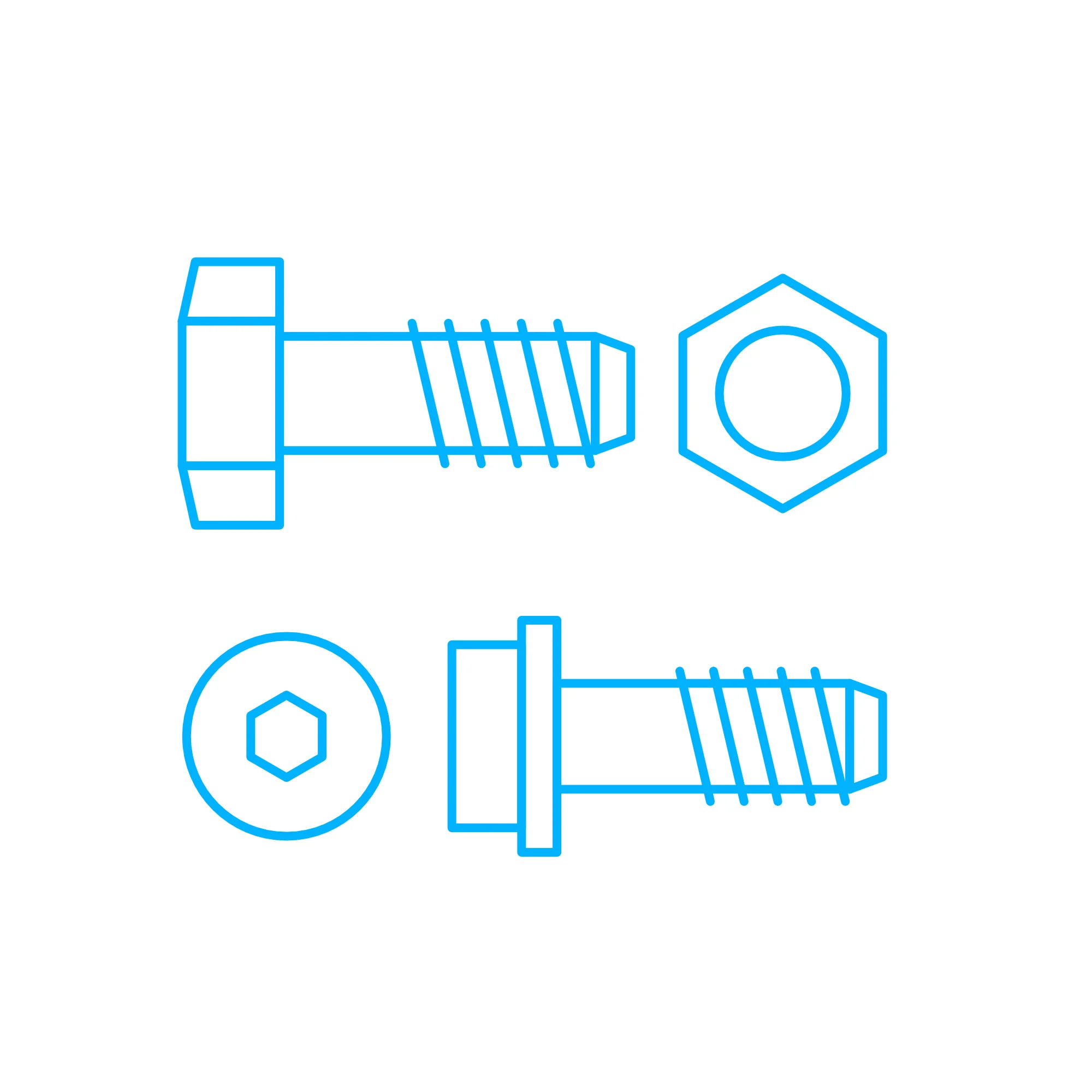SCREW,THREAD-CUTTING Screws for Marine and Diesel Engines
Screws are precision fasteners that clamp engine components into a single, load-bearing structure. In marine, diesel, and gas engines they secure cylinder heads, manifolds, fuel equipment, turbochargers, covers, and auxiliaries. Whether hex head, socket head, or specialty designs, engineered screws deliver controlled clamping force, resist vibration, and maintain sealing surfaces under dynamic thermal and mechanical loads. Within this category, SCREW,THREAD-CUTTING variants also play a role in ancillary systems, electrical enclosures, and brackets, providing reliable fastening directly into base materials where tapped holes are impractical.
Technical function of Screws in engines – SCREW,THREAD-CUTTING marine engine applications
The fundamental job of an engine screw is to generate and maintain preload—the axial clamping force that holds joint members together. When the engine runs, combustion pressure, torsional vibration, and thermal cycles attempt to separate those members. Properly selected and tightened screws create a preload higher than the external forces, ensuring joints do not slip, gaskets remain compressed, and rotating assemblies stay in alignment. In a diesel engine, preload consistency is critical for cylinder head sealing, turbocharger flange integrity, and exhaust manifold stability. In auxiliary systems and enclosures, a SCREW,THREAD-CUTTING marine engine application avoids separate tapping by forming its own thread in the base material, saving time while still achieving dependable retention when specified correctly.
Performance and efficiency are directly tied to how well screws manage joint behavior. Accurate preload minimizes micro-movement that causes fretting and heat build-up; it preserves surface flatness for heat transfer; and it prevents leaks that reduce turbo efficiency or increase emissions. Safety benefits follow: secure fuel-injection components reduce fire risk, and stable guardings prevent accidental contact with moving parts. For maintainers, repeatable friction characteristics and compliant thread geometry allow torque or torque-angle tightening methods to achieve the intended clamping force—vital when servicing with OEM parts in confined engine rooms.
Materials, coatings, and thread geometry in diesel and gas engines
Engine screws are typically manufactured from alloy steels with high property classes (e.g., 10.9 or 12.9) for structural joints, stainless grades for corrosion resistance in seawater atmospheres, or nickel alloys for high-temperature zones. Surface treatments—zinc-nickel, phosphate with lubricant, PTFE, or other anti-galling coatings—control friction scatter so that tightening torque converts predictably into preload. Thread forms follow standards (metric or inch) with controlled tolerance classes to ensure proper fit. For SCREW,THREAD-CUTTING diesel engine OEM parts used in sheet metal or plastics around the engine, specialized thread profiles create clean, load-bearing female threads while minimizing cracking in the host material.
· High tensile strength for stable preload under vibration.
· Heat-resistant alloys and coatings for hot zones.
· Corrosion protection tailored to marine atmospheres.
· Tight thread tolerances for repeatable torque–tension.
· Anti-galling finishes for stainless and high-nickel joints.
· Self-locking features or paired hardware for vibration resistance.
· SCREW,THREAD-CUTTING options for enclosures and brackets.
· Compatibility with torque-angle tightening procedures.
· Traceable batches for quality management and class compliance.
Importance for reliable engine operation and service life
Incorrect, worn, or unsuitable screws compromise the entire engine. Loss of preload leads to gasket blow-by, exhaust leaks, and reduced turbo efficiency. Fretting at joint interfaces accelerates wear and can propagate cracks. Inadequate heat resistance causes relaxation and torque loss during hot operation. Using nonconforming thread geometry risks stripping, cross-threading, or galling—especially in stainless joints—resulting in costly downtime and rework. On high-speed diesel and gas engines, even minor loosening can shift rotor alignment, degrade coupling life, and increase bearing loads. Proper screws maintain geometry, sealing, and vibration control, directly extending service intervals and protecting major components from secondary damage.
Advantages of OEM spare parts suitable for Screws
Choosing OEM spare parts suitable for Screws ensures the engineered match between material, heat treatment, thread class, and surface finish that the engine designer specified. That alignment delivers predictable preload at the prescribed torque, keeps friction coefficients within the assumed range, and safeguards the joint’s fatigue life. Dimensional fidelity around shank-to-hole fit and under-head bearing surfaces preserves joint stiffness and reduces embedment relaxation. For purchasers and technical managers, this means performance you can forecast, reduced risk during overhauls, and consistent results across global fleets—all while protecting the maintenance budget by preventing repeat work and component collateral damage.
For SCREW,THREAD-CUTTING OEM parts used around a diesel engine or marine generator, correct tip geometry and drive design reduce installation torque, avoid material cracking, and maintain retention over thermal cycles. Stocking OEM-equivalent fasteners by drawing number simplifies cross-referencing and ensures that tightening procedures, lubricants, and reusability guidelines remain valid across service events.
MOPA as a partner for OEM spare parts Screws
MOPA is an experienced and reliable partner for OEM spare parts Screws. We source and deliver OEM parts for diesel and gas engines with speed, quality, and security—backed by rigorous supplier selection, documentation, and batch traceability. Our team supports you with technical cross-references for SCREW,THREAD-CUTTING OEM parts, tightening recommendations aligned with manufacturer data, and logistics that match the urgency of dry-dock or on-voyage maintenance. From single urgent picks to consolidated project kits, MOPA streamlines procurement so your engine returns to service faster and stays there longer.
Conclusion
Screws are critical to engine integrity, efficiency, and safety—whether clamping high-load structural joints or enabling fast installation with SCREW,THREAD-CUTTING solutions around the power unit. Selecting OEM spare parts suitable for Screws secures predictable preload, corrosion resistance, and long service life, helping fleets and plants control risk and cost while protecting uptime.

